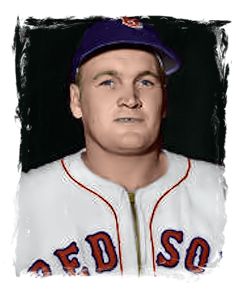 |
Edgar "Eddie" Smith was born in Mansfield, New Jersey on December 14, 1913. He’d been on the A’s radar since at least 1931, when they gave him a tryout at Shibe Park, and he threw batting practice in 1933. In both 1934 and 1935, he pitched well enough to help the Chesterfield semipro team win the Lincoln Tournament titles. In October 1934, a week after he struck out 17 Chambersburg batters in the semifinal game, he struck out 18 batters to win that year’s title over the Broad St. Park team. He was signed by the Athletics and worked out in Florida with the big-league club during 1935 spring training. He was sent to Reading for a month or so in 1934, but only in batting practice. His pro career started in Pennsylvania with the 1935 Williamsport Grays of the Class-A New York-Penn League, an affiliate of the Athletics. Working the full season of 1936, he won 20 games and lost only 8 for the fourth-place Grays. His debut in the big leagues came in September 1936. It was the second game of a doubleheader against the visiting Boston Red Sox and Eddie threw a complete game win. Connie Mack welcomed him back in 1937, and his record was 4-17, with a 3.94 ERA, that was best among the Athletics’ starting pitchers, though his winning percentage was the worst. But his 1938 stats were discouraging. Working mostly in relief, he was 3-10 had a 5.92 ERA, and was placed on waivers early in the 1939 season. The White Sox claimed him and he pitched markedly better, starting 22 games for them and recording a 3.69 ERA. He had a very good year indeed in 1940, 14-9 with a 3.21 earned run average, which was the fourth-best in the league and he was marginally better in 1941. He is perhaps best known for giving up the base hit with on which Joe DiMaggio began his famous 56-game hitting streak. Another notable moment of the ’41 season was when he became the winning pitcher in the All-Star Game, where Ted Williams hit a three-run homer in the bottom of the ninth, to boost the A.L. to a 7-5 victory. In 1942, he was named to the All-Star squad again, though it could be the only time in baseball history that a pitcher started the season 0-10 and was named an All-Star. He did end the season leading the league, in losses at 7-20. In 1943 he was 11-11 with a 3.69 ERA. He enlisted in the United States Army in November 1943, in Camden. New Jersey. He went on to serve in the infantry and saw duty in Africa and Italy. He returned to the big leagues in 1946, and had his statistically best season, at 8-11 with a 2.85 ERA. Whatever he had going for him however, wasn’t working in ’47. His earned run average was 7.29 and he wasn’t being used much, for what are obvious reasons. In August, he was waived by the White Sox and the Boston Red Sox claimed him. He pitched almost identically for Boston and was unconditionally released in October. In February 1948, he was acquired by the Hollywood Stars of the Pacific Coast League. But he was released in early June and hooked on with the Sacramento Solons, where he ended 1948 and his career. Though still on the roster at the beginning of April 1949, he did not pitch for the team. He was offered the same terms as in 1948, but he wanted a raise and it wasn’t forthcoming, so he requested his release and received it. He played some semipro ball in New Jersey for Bordentown, through 1951, and took up work as a bartender at the Pig ‘n’ Whistle Inn at Browns Mills, New Jersey. Around 1960, he was working as a bartender in Bala Cynwyd at the Lynwood Tavern. In August 1965, he was charged with manslaughter in the death of another patron. The two had apparently gotten into a barroom argument over whose turn it was to play pool. They stepped outside and he struck the other man, whose head struck the sidewalk and died. He did find work again, by the early 1970s, tending bar at Eddie Fuller’s Bar in Bordentown. Edgar Smith died of cancer, on January 2, 1994, in Willingboro, New Jersey at age 80. |
|||||
